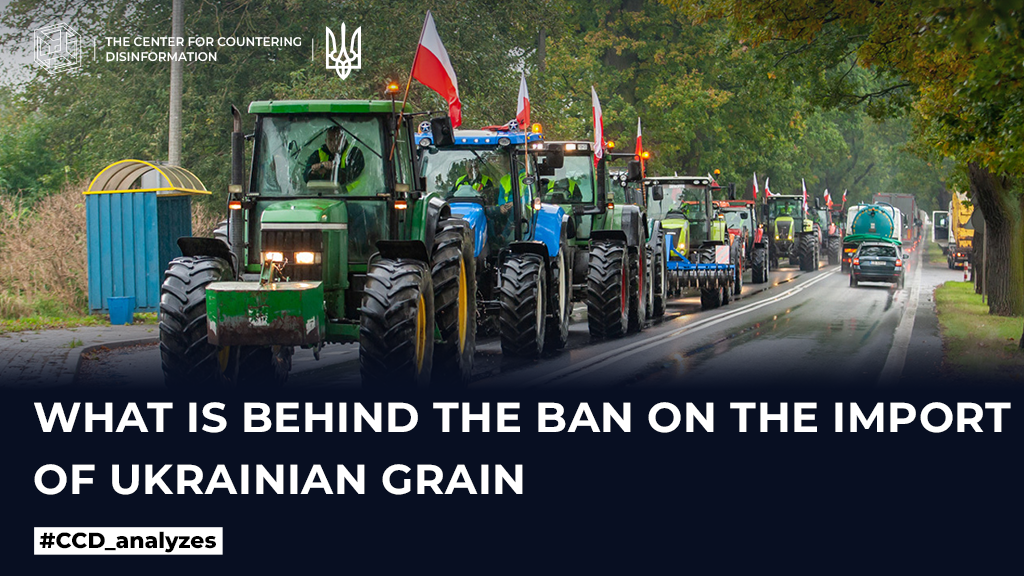Decisions against the export of Ukrainian grain to Europe have the effect of a chain reaction. After the order of the Polish government to temporarily ban the import of grain and a number of other food products from Ukraine, the government of Hungarian Prime Minister V. Orbán also banned the supply of Ukrainian grain, oilseeds and “some other” agricultural products until June 30, 2023. The introduction of such a ban is currently being discussed by the leadership of Bulgaria, Romania and Slovakia.
What is the problem and how does it threaten Ukraine?
❗️In the conditions of the russian maritime blockade of Ukraine and the threat of stopping the export of Ukrainian grain to traditional sales markets, in particular African countries, the EU canceled all tariffs and quotas for the import of Ukrainian grain so that it could transit through Europe to other regions of the world.
Poland acted as the main land transshipment hub for the transit of Ukrainian grain to third countries (500-700,000 tons of various agricultural products from Ukraine, including up to 200,000 tons of grain, cross the border of Poland every month). But in practice, instead of re-exporting to African countries, grain traders in Poland, Romania, Bulgaria, Hungary and Slovakia began to buy cheap Ukrainian grain themselves, which led to a significant decrease in the price of this product and caused protests by local farmers.
The reaction of Ukraine and the EU
The European Union condemned the ban on the import of Ukrainian grain introduced by Poland and Hungary. The representative of the EU emphasized that unilateral actions of the member states in the sphere of trade are unacceptable and all the member states of the bloc should coordinate and agree on the trade policy within the framework of the EU.
The Ministry of Agrarian Policy and Food of Ukraine stated that our state understands the difficult situation of Polish farmers, but the Polish ban violates existing bilateral export agreements, and called for constructive negotiations to resolve this issue.
What actually causes such a reaction of neighboring countries?
For the Polish leadership, the grain issue, in addition to the economic factor, turned out to be more politicized, because the ruling conservative party “Law and Justice” (L&J) relies on voters from among farmers and residents of rural areas. The exodus of even part of the farmers could lead to the loss of power in the parliamentary elections in the fall of 2023. It is worth noting that the Polish government itself provoked a critical situation on the grain market when, contrary to the statements of L&J politicians, instead of further exporting Ukrainian grain to the countries of North Africa and the Middle East, it left it in Polish grain warehouses for domestic consumption (a total of 2.152 million tons of grain arrived from Ukraine). As a result of such an ill-considered policy, farmers’ warehouses are now overflowing with grain from last season, and the price of wheat on the Polish stock exchanges has halved in half a year. Therefore, in an attempt to correct the situation, on the eve of the elections, L&J supported the government in the decision to ban the import and transit of Ukrainian agricultural products. The possible “russian footprint” in shaking up the grain conflict should not be dismissed either. After all, the opponents of the ruling political force are the opposition party “Confederation of Freedom and Independence”, known for its close cooperation with the “Deceited Village” farming movement (the organizer of mass actions against the import of Ukrainian grain), as well as Eurosceptic views that are identified with the line of pro-russian propaganda. Therefore, the coming to power of a pro-russian party can not only split Polish society, but also affect the state of Ukraine-Poland relations. Now the Polish government is considering several options for solving the situation and emptying granaries before harvesting. In particular, it is envisaged to strengthen control over the import of food products from Ukraine and launch the export of Polish grain within the framework of humanitarian aid.
The governments of Hungary, Romania, Bulgaria and Slovakia are playing a similar card of “protecting the interests of farmers” and are demanding that the European Union reconsider the decision to cancel tariffs on products from Ukraine.
❗️In the short term, the already introduced restrictions on the transportation of Ukrainian grain complicate logistics processes, and therefore create inconvenience for Ukrainian farmers.
Considering the position of the EU on this issue, there is every reason to hope that, during discussions with the European Commission, Budapest and Warsaw will soon reach agreements that will meet the economic interests of Poland and Hungary, as well as the strategic interests of Ukraine and Central Europe. The main thing is that the controversial decisions of neighboring states regarding the export of grain do not change their position on supporting Ukraine. The leader of the ruling L&J party, Ya. Kaczynski emphasized that while protecting the interests of its citizens, Poland remains a constant friend and ally of Ukraine and will continue to fully support it in the war with russia.










